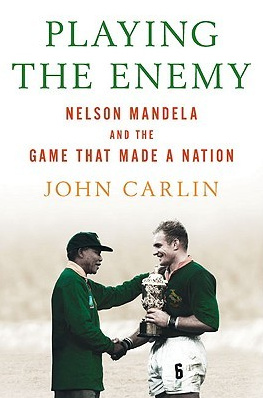

John Carlin · 288 pages
Rating: (3.5K votes)
“Sport has the power to change the world. It has the power to inspire, the power to unite people that little else has...It is more powerful in govenments in breaking down racial barriers.”
― John Carlin, quote from Playing the Enemy: Nelson Mandela and the Game That Made a Nation
“Your freedom and mine cannot be seperated”
― John Carlin, quote from Playing the Enemy: Nelson Mandela and the Game That Made a Nation
“Should a black woman carrying her "madam's" white baby travel in the "whites only" or the "nonwhites" section of the train? Or would a Japanese visitor who used a "whites only" public toilet be breaking the law? Or what was a bus conductor to do when he ordered a brown-skinned passanger to get off a whites-only bus and the passanger refused, insisting that he was a white man with a deep suntan?”
― John Carlin, quote from Playing the Enemy: Nelson Mandela and the Game That Made a Nation
“Most important of all, Mandela stated that the way to a negotiated solution lay in a simple-sounding formula: reconciling white fears with black aspirations.”
― John Carlin, quote from Playing the Enemy: Nelson Mandela and the Game That Made a Nation
“Having won over his own people—in itself no mean feat, for they were a disparate bunch, drawn from all manner of creeds, colors, and tribes—he then went out and won over the enemy.”
― John Carlin, quote from Playing the Enemy: Nelson Mandela and the Game That Made a Nation

“This was the moment when I understood more clearly than ever before that the liberation struggle of our people was not so much about liberating blacks from bondage,” Sexwale said, picking up on the core lesson he had learned from Mandela in prison, “but more so, it was about liberating white people from fear. And there it was. ‘Nelson! Nelson! Nelson!’ Fear melting away.”
― John Carlin, quote from Playing the Enemy: Nelson Mandela and the Game That Made a Nation
“I meant “tribalism” in the widest sense of the word, as applied to race, religion, nationalism, or politics. George Orwell defined it as that “habit of assuming that human beings can be classified like insects and that whole blocks of millions or tens of millions of people can be confidently labelled ‘good’ or ‘bad.”
― John Carlin, quote from Playing the Enemy: Nelson Mandela and the Game That Made a Nation
“So let me get this straight.”I rub my nose.“You've brought me out to hunt and kill animals with my bare hands?”A smile ghosts his face. He scratches his cheek. “Well teeth, but basically, yes.”Oh God. This is his idea of going out? No wonder he hasn't got a girlfriend.”
― Samantha Towle, quote from First Bitten
“There's nothing more satisfying than being stupid with a friend.”
― Fiona Wood, quote from Six Impossible Things
“I’ve always been a dreamer, have always believed
in the power of love and art and loud, life-affirming rock and roll, but, for the first time,
I’m starting to have doubts. Can a dream even exist in reality? Or does it turn to stone
the second it leaves your mind?”
― Pete Wentz, quote from Gray
“There is not a moment in which God does not present Himself under the cover of some pain to be endured, of some consolation to be enjoyed, or of some duty to be performed. All that takes place within us, around us, or through us, contains and conceals His divine action.”
― quote from Abandonment to Divine Providence: The Classic Text with a Spiritual Commentary
“Why do people go to these places, these places that are not for them?
It must be that they believe in their night vision. They believe themselves able to draw images up out of the dark.
But black wells only yield black water.”
― Helen Oyeyemi, quote from White is for Witching
BookQuoters is a community of passionate readers who enjoy sharing the most meaningful, memorable and interesting quotes from great books. As the world communicates more and more via texts, memes and sound bytes, short but profound quotes from books have become more relevant and important. For some of us a quote becomes a mantra, a goal or a philosophy by which we live. For all of us, quotes are a great way to remember a book and to carry with us the author’s best ideas.
We thoughtfully gather quotes from our favorite books, both classic and current, and choose the ones that are most thought-provoking. Each quote represents a book that is interesting, well written and has potential to enhance the reader’s life. We also accept submissions from our visitors and will select the quotes we feel are most appealing to the BookQuoters community.
Founded in 2023, BookQuoters has quickly become a large and vibrant community of people who share an affinity for books. Books are seen by some as a throwback to a previous world; conversely, gleaning the main ideas of a book via a quote or a quick summary is typical of the Information Age but is a habit disdained by some diehard readers. We feel that we have the best of both worlds at BookQuoters; we read books cover-to-cover but offer you some of the highlights. We hope you’ll join us.